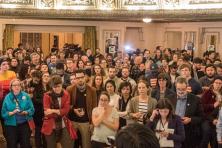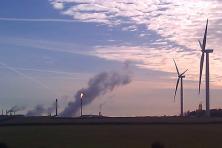"[Climate science deniers are] so out of touch with science that they believe rising sea levels don't matter, because in their view, the extra water will just spill over the sides of a flat Earth."
- Secretary of State John Kerry at the Paris climate negotiations
An American audience might have laughed.
But at the climate negotiations in Paris, this jab - and the long passages responding to climate science denial in Secretary Kerry's otherwise terrific speech - fell flat. Almost no one else takes this crap seriously. The world is busy struggling to cope with escalating impacts in a year that will shatter global temperature records. Freakishly extreme rainfall reports from around the world came in almost daily during the negotiations. While domestic audiences might have appreciated how thoroughly Kerry undressed deniers, it sounded lame in Paris. Hearing a senior American official battling against fossil fuel-funded science deniers for control of our national climate agenda only served to remind the world that - humiliatingly - we still have to.
Like most Americans, I've pretty much lost faith in the United States Congress. Smaller scales of political organization seem more practical and legitimate. I identify strongly as a Seattleite, a Washingtonian, and a Cascadian, a creature of salmon-bearing watersheds. It hardly ever occurs to me to wonder what it means to be an American; it just doesn't seem like a very relevant or practical question with respect to actually doing things. And though vital issues like immigration and security are inescapably national and international, I find the national dialogue on them so troubling I can hardly watch, let alone identify.
With so much momentum for climate action in our cities and states and in the burgeoning clean energy economy, it's easy to turn away from our national legislative dysfunction. But when the whole world comes together to cooperate for solutions, Americans have to answer for it. It's the primary reason the emission reduction commitments in the agreement are not enforceable, the big showstopper. The world still can't fully commit to climate solutions because the US Senate stands in the way.
3 tough COPS
The Paris meeting was the 21st Conference of the Parties to the UN Framework Convention on Climate Change - "COP 21." I've been to three of them; each one poked my sense of responsibility as an American back to life.
COP 11 was held in Montreal in 2005, the year the Kyoto Protocol went into effect without the US. We stood alone and deeply resented among the world's rich nations in resisting the global campaign for solutions. Seattle Mayor Greg Nickels, who led the US Mayors' Climate Compact, posted a map on the wall showing all the participating US Cities, pointing to the pins on the map as "signs of intelligent life in the U.S." The Bush Administration's dismissiveness and obstructionism in the talks were a national embarrassment.
A week prior to COP 15 in Copenhagen, President Obama, not yet a year in office, received what amounted to a prospective Nobel Peace Prize - so desperate was the global community for the world's biggest emitter and most powerful economy to get on board with a climate agreement. But the Copenhagen Accord was weak, not least because the U.S. - even with Democratic majorities in both houses of Congress - had failed to ante up with a national climate policy. People from all over the world grilled me about how the U.S. Senate works and why we Americans couldn't rein it in. I cringe when I think of all the pained pronunciations of "filibuster." And I'll never forget the experience of trying to explain to an Indian colleague how one Senator from North Dakota, representing as many people as a single Mumbai slum, could hold up the whole global show. After all the build-up to "Hopenhagen," listening to President Obama's peevish, curt speech to the final plenary ranks among my lowest moments as an American.
.
COP 21 went much better, in no small part because the Obama Administration managed to forge ahead with meaningful commitments without having to submit them for Senate ratification. President Obama stopped waiting for Congress. And people stopped waiting for national governments. Indigenous people and communities of color, labor and business, state and local government leaders, health and faith communities, activists and wonks flooded Paris in an unprecedented convergence of human will for solutions. You can wake up on either side of the bed with respect to the content of the Paris Agreement, but you can't help but take heart at the gathering momentum of the climate movement and the clean energy revolution. The Paris Agreement bears the indelible mark of that rising public will, while usefully illuminating how far we have to go.
Press conferences at COP21 ran pretty much continuously for 2 weeks, in conference rooms full of international reporters. And whenever a U.S. speaker finished, the questions almost invariably focused on whether the world could trust anything we said about commitments to climate action. Donald Trump's xenophobic spectacle politics dominated our domestic media, and Americans in Paris were called to account for it. Most folks in Paris dismissed the influence of Congressional Republicans who did their best to undermine US leadership in the climate talks,... probably a wise tactical decision. But their shameless nose-thumbing was not lost on the global audience. If nothing else, it was a slap in the face to Americans from all walks of life who came to show the world a constructive, solution-focused face of our country. For the most part we succeeded, but the world can't help but wonder whether we will overcome the fossil fuel industry's stranglehold on our politics, and how much our pledges mean until we do.
On we go, Americans
Coming out of Paris, Americans can justifiably be proud of this: Despite decades of foot-dragging in Washington DC, the world still needs and expects and wants to believe in American leadership. Civil society colleagues from around the world are not so much angry at Americans as frustrated, agitated; they seem to still believe in our capacity and responsibility to offer that leadership... more than we do ourselves. We can also be proud of what President Obama, Secretary Kerry and the US team did to deliver a meaningful US contribution in spite of the GOP's heckling. You can argue with some of their negotiating positions - especially on climate justice and finance, where the US still seems begrudging. But Kerry was a bulldog and the President stayed focused, working the phones to heads of state after his visit to Paris at the beginning of the talks. The sheer display of diplomatic will to get a meaningful deal done - in spite of domestic political madness - was impressive.
But before the ink dried on the Paris Agreement, they bowed to the oil industry's power and dealt away the crude oil export ban.
Does that make you cynical? Does the hypocrisy vindicate your sense that the Obama Administration might be less than steadfast in the commitments it celebrated in Paris? If so, you come by it honestly.
Thing is, though, cynicism doesn't do the climate or the future a lick of good. The world only wins climate solutions if the United States shows all the way up. And no matter how hard it may be to hold our own country accountable for that, it remains our indispensable role.
Taking our democracy back from the fossil fuel industry is climate solution #1, our highest patriotic duty in 2016.
Author's note: I use the term "American" here to mean a person whose home is the United States. I apologize for the US-centrism of that, but couldn't figure out another way to make the point.




